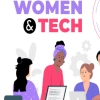DesArrolladoras (Developers)
The DesArrolladoras (Developers) project emerged as an initiative of the Department of Corporate Citizenship in Samsung's offices in Spain with the aim of improving people's lives by breaking down barriers through technology. The commitment to promote employability is rooted in providing digital training to women and offering the knowledge learners in today's world need to navigate in an ever-changing and highly demanding sector.
Thanks to the DesArrolladoras educational project, which officially started in November 2018, 220 women received programming training via a 50-hour online course. The 17 best-performing profiles were then selected to upskill further, continuing the training programme in the form of a more advanced face-to-face course. Students who completed the course received an official diploma during a special event held at the Polytechnic University of Madrid.
Scaling up: from pilot programme to good practice
After the success of the pilot programme of the project, a new call was opened in 2019. More content, as well as different levels of trainings, covering all needed knowledge from scratch, were also added. This resulted in an increase of the number of available training hours and an increase in interest in the programme. The second part of the initiative kicked off on 20 May 2019 with the support of Bejob, an experienced training company belonging to the Santillana Group.
The initiative set an ambitious goal for itself: training 1.000 women in Spain before moving on to surpass its original expectation. More than 1.000 applications were received for the DesArrolladoras programme, despite initial doubt in the ability of the initiative to achieve these numbers. More specifically:
- The Samsung DesArrolladoras project made possible for more than 1,000 women without prior skills in programming to receive training free of charge.
- Programme participants can now demonstrate knowledge of some of the most in-demand programming languages nowadays, such as HTML, CSS, and JavaScript - together with more specialised knowledge in artificial intelligence or big data.
- The programme was successful in breaking barriers to technology, with more than 1.000 women entering a new labour market with their skills being in high-demand.
Programme structure: from 0 to proficiency
The course combines online and classroom-based training, starting with a 50-hour online course where students acquire basic knowledge of web development. After they pass this level, learners continue with a 100-hour online training pathway, where they learn how to develop web applications using standards such as HTML5 or CSS3. The next stage contains 150 hours of training in an online format together with instructors, where participants learn how to carry out Full Stack development with JavaScript. The girls that pass these three stages will become experts in Artificial Intelligence and Big Data through 450 total hours of online and classroom-based training.
Why is this a good practice?
Samsung DesArrolladoras was born to address the challenge due to the shortage of women in Spain in the field of engineering and technology (only 12%) despite the fact that today, there is a great demand for professionals in this field.
Samsung DesArrolladoras has already trained more than 5,000 women since its first edition with a program to motivate and interest women in STEM disciplines. 2024 marked the end of the 5th edition of the program where 1,000 women have been trained in the world of web programming.




